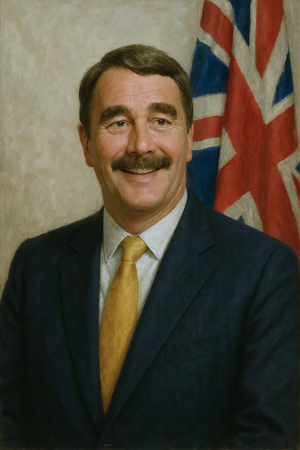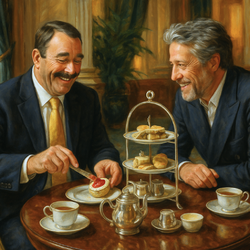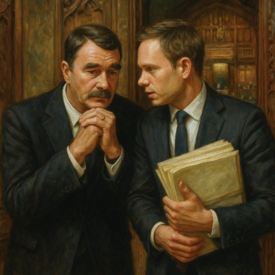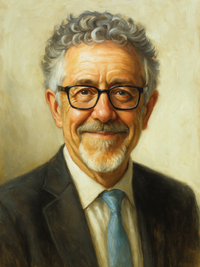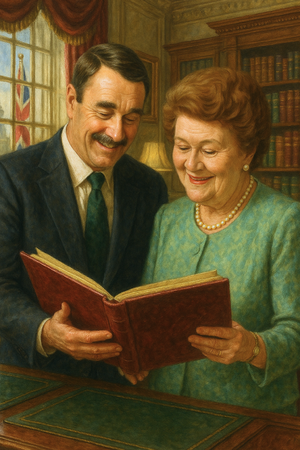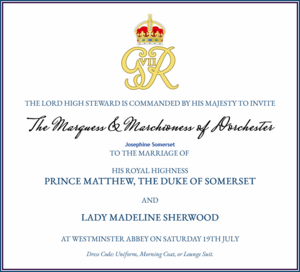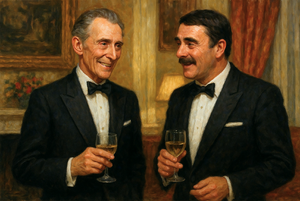Premiership of the Marquess of Dorchester
 | |
| Premiership of the Marquess of Dorchester 20 June 2025 – 25 August 2025 | |
| Monarch | George VII |
|---|---|
| Cabinet | Dorchester Ministry |
| Party | Unionist Party |
| Seat | 10 Downing Street |
|
| |
Thomas Carew, The Marquess of Dorchester's fourth tenure as Prime Minister of Great Britain began on 20 June 2025, when he accepted an invitation from His Royal Highness Prince William, The Prince Regent, to form a Government in the name of King George VII, following his win in the June 2025 General Election. It ended on the 25 August 2025, following the results of the August 2025 General Election, where he decided not to seek re-election as Prime Minister. His Premiership occurred during the 40th Parliament of Great Britain. During this time he also served as Leader of the Unionist Party and First Lord of the Treasury. Furthermore, until the 20 July 2025, he served as Secretary of State for Culture, Media, and Sport. He was the sixth Prime Minister of George VII, the fourth to be elected in his reign, and the first to have served under him in more than one tenure: Carew was the King's first Prime Minister, having served for the first six days of his reign. It was his fourth tenure as Prime Minister, and he succeeded the only other person to have served as Prime Minister four times, James Forsyte, The Duke of Warwick. He was succeeded by his long-standing political friend and Deputy Prime Minister, Llywellyn Carew, The Viscount Marloes.
Considered one of the best "Summer slump" Premierships in regional history, the Dorchester Premiership saw major successes in various areas. In Onsite affairs, despite a fall in the nation-count, there was an explosion of activity, the rise in active World Assembly Endorsements, and the laying of appropiate foundations and further rejuvenation of Gameside Development. In economic affairs, the term saw the return of the interest rate, the introduction of Premium Bonds, commissions on both Bonds and a working Stock Market, liberalisation and deregulation of the National Shop, and the introduction of working committees on Estates. In Foreign Affairs, the term saw relations furthered with regions such as with the Plains of Perdition, and with regions in Libcord. The term also included the landmark London Conference convened with the New United Kingdom (NUK), which was close to agreeing on a merger between EoGB and NUK. In cultural affairs, the Prime Minister upheld and reintroduced key reforms for transparency and integrity, such as the release of cabinet memorandums, continuation of the Prime Minister's Journal, and various cultural initiatives such as a Ruby Parliament Dinner, a Rock Concert, Chief Mouser elections, a Royal Wedding, an active RP Cabinet reshuffle, and an Honoured Citizen Act. Yet, there were moments of failure and of controversy: the nation count fell despite the good work of Carew's predecessor; premium bonds were never enacted during the Premiership, that coming during the premiership of Carew's Deputy Prime Minister and successor, Lord Marloes; and a slow start to the term diplomatically, alongside unfulfilled initiatives such as the Chequers Foundation.
To date, it remains Thomas Carew's fourth - and last - tenure as Prime Minister: in personal memoirs he continued to state that the Dorchester Premiership was in his view, one of his most successful and rewarding periods, second perhaps only to the infamous Knightstone Premiership.
Background
Common Cause Alliance
The previous term was dominated by the Common Cause Alliance, which soon merged into the Commonwealth Non-Aligned Alliance. Carew served as First Secretary of State and for around twenty days at the start of the Premiership, as Secretary of State for Foreign Affairs. He was the only Unionist politician in Cabinet, until Josephine Somerset, The Duchess of Bedford was announced as his replacement in the Foreign Office (she would later resign too and be replaced by August Carew, 2nd Earl of Strathmore).
The term was considered a success by many, including Carew, but was also marred with serious allegations and scandals, such as court cases against The Independent Newspaper, rampant leaks, and allegations of political collusion and lack of transparency. The Prime Minister, James Forsyte, The Duke of Warwick, declined to run for a second term.
June 2025 General Election
For more information, see: June 2025 General Election.
Premiership
Following the results of the June 2025 General Election, Carew was invited to Buckingham Palace to form a Government in the name of King George VII.[1] Owing to his absence, this was undertaken by William, Prince of Wales, acting as Prince-Regent. It was the first time someone other than the incumbent Sovereign oversaw this invitation. Carew accepted on the evening of the 20th June.
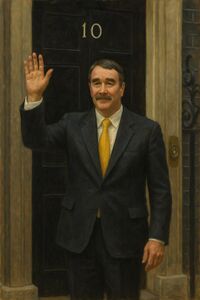
The following day, Carew published his opening statement, subtitled with the quote "In politics, what begins in fear usually ends in failure" by Samuel Taylor Coleridge.[3] In the statement, Carew reaffirmed his commitment to a transparent and honest Government, stating that "Without the trust of the people, a Government is little more than a dictatorship begging to be destroyed with the disdain of the people it says it serves and protects." and that "We must begin the work of Governance, the only way we know how: with good humour, transparency, and efficiency."[3]
Cabinet
For more information, see: Dorchester Ministry.
This was the fifth Ministry in which Carew served as Prime Minister, second only to James Forsyte, The Duke of Warwick.
Composition
Carew's cabinet consisted of an even and noticeable spread of both Unionist and Commonwealth Non-Aligned politicians, though noticeably, no member from the latter served as Deputy Prime Minister or as First Secretary of State.[4] The Cabinet was appointed by the returning Sovereign, on the advice of the Prime Minister, on 21 June.[5] Many of the appointments were well-recieved, notably the appointment of Llywellyn Carew, The Baron St Brides as Deputy Prime Minister. This was the first cabinet appointment that Carew had confirmed when considering running for election, and it marked the second time Llywellyn Carew served as DPM to Thomas Carew: they duly served as such in the First Sidmouth Ministry. Carew's counterpart in the CNA, Xavier Sherwood, was appointed as Chancellor of the Exchequer, where he was considered "the least socialist" of the members of his party when it came to the economy, and Carew had recieved assurances about his commitment to campaign pledges, such as the return of the interest rate, before appointing him. August Carew, 2nd Earl of Strathmore, continued in his role as Secretary of State for Foreign Affairs, extending his record as the longest-serving Foreign Secretary. Madeline Sherwood also remained in post as Secretary of State for the Home Office. Other appointments included: Josephine Carew, Marchioness of Dorchester as both Leader of the House of Commons and Secretary of State for Gameside Development (renamed from Overseas Development); The Baron Tiff of Ottery St Mary as Minister of State for Administrative Affairs; and Carew himself as Secretary of State for Culture, Media, and Sport.
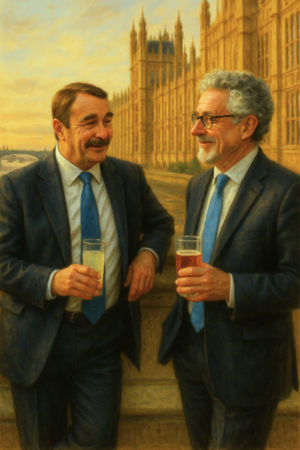
Originally, James Forsyte, The Duke of Warwick - departing Prime Minister - was Carew's first choice for Chancellor. Furthermore, Esther Sherwood was to remain as Culture Secretary, but IRL commitments meant she could no longer do so and the position was filled by Carew himself. Anastasia Nelson, Lady Hereford was also significantly considered for the role of Home Secretary. Ultimately, Madeline Sherwood remained in the position, while Lady Hereford became Second Permanent Secretary in the Home Office.
Reshuffles and Changes
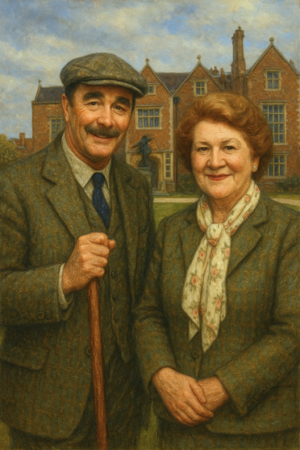
The Prime Minister commenced a reshuffle on the 20 July, halfway through the term. This was precipitated by earlier conversations with the Leader of the House of Commons and Gameside Development Secretary, Josephine Carew, who stated that she wished to resign from the latter. Carew promised to do so, on the condition that she remained in post until a successor was found.
On the 20 July, The Times reported that a shuffle was incoming, with the information not being released to Cabinet beforehand: The Times reported it as a "minor cabinet reshuffle".[6]
For the first time in regional history, the reshuffle was "televised", or rather, acted out in an RP sense with the Prime Minister inviting Ministers and members of the region one by one to see him at 10 Downing Street, to reveal what position they were to undertake.[7] Carew hoped that this would be entertaining and informative in equal measure, and it proved popular.[8] The reshuffle began with the return of Charles Wright, The Baron Huntingdon as the new Gameside Development Secretary: his antics at requesting a change of name for the department so publicly was taking in good spirits by the Prime Minister, though later memoirs and credible sources suggested that the Prime Minister considered it a major breach of public courtesy to not bring it up prior to the appointment, and found the general conduct surrounding the situation severely disappointing.[9][10] Nevertheless, Wright was welcomed to the Cabinet.
Jacob Menzies - a new citizen following the lifting of the proscription in NSUK - was appointed as Secretary of State for Culture, Media, and Sport, a position formerly filled by the Prime Minister up to that point.[11] Menzies expressed surprise and also humility at his appointment.
The Times reported just after this on the appointments - titling the tweet as "Old Dog. New Tricks?" in reference to the return of Charles Wright.[12] It also gave the first indication to other meetings: a non-RP meeting between the Prime Minister and his Foreign Secretary was discussed, in which the Foreign Secretary avoided the cameras by taking another entrance into 10 Downing Street.[12]
Carew then saw his wife - the Leader of the Commons and recently replaced Gameside Development Secretary - who was to be appointed as both First Secretary of State and as Secretary of State for Foreign Affairs, replacing August Carew in the latter.[13] As a result, the position of Leader of the House of Commons fell vacant.
Carew later outlined the changes in a single statement from 10 Downing Street: he also explained that August Carew, 2nd Earl of Strathmore had remained as Foreign Secretary as a kind favour, and that he was now retiring from active politics.[8] August Carew did, however, accept the position of Downing Street Chief of Staff for the remainder of the term, and was invited to Cabinet as a result. He also remained active in the Foreign Office, serving as an unofficial Deputy.
Precedence
Owing to Carew's previous amendments to various acts, Prime Ministers were now required to establish an Order of Precedence, or Line of Ministerial Succession (Carew preferred the former styling). While not mandated to be publicly published, Downing Street duly did so, outlining Llywellyn Carew, The Baron St Brides as the immediate successor to Carew.[14] Following him was the Leader of the House of Commons, and then the Chancellor of the Exchequer. No further Ministers were mentioned.
Folllowing the Cabinet Reshuffle of the 20 July 2025, the names were changed but the order was not: the Deputy Prime Minister, Llywellyn Carew, was followed by the First Secretary of State (Josephine Carew) and the Chancellor, but now following this the Prime Minister mandated Madeline Sherwood-Somerset, Duchess of Somerset as fourth on the Order of Precedence.[15]
Civil Service Reform
During Carew's time as First Secretary of State in the Second Warwick Ministry, he spoke at length with the new Head of the Civil Service and Cabinet Secretary, Sirch Somerset, 2nd Duke of York. Much of the discussion was regarding the suitability of the Civil Service and its place within Government.
Upon Carew's appointment as Prime Minister, he set about changing and promoting the civil service as a means for working in Government, as opposed to the traditional and more haphazard method of giving junior politicians makeshift Minister of State roles. Carew instead went about recommending the creation of Permanent Secretaries - and that any promotion would to Secretary of State would mean the members departure from the civil service. However, it also meant that many new members of the Civil Service would provide continuity in their roles, remaining in post even as the Prime Minister changed.
Carew also mandated, in a statement two days after his return to 10 Downing Street, that he would still create Minister of State roles if it was required. However, this would only be for helping out in key areas, or for Ministers with specific remits. All other appointments would be to the Civil Service.[16]
Such a move marked one of the biggest changes in cabinet policy in the history of the region, and one of the first times in many Ministries that no Minister of State was amongst Cabinet.
Carew, as the Prime Minister responsible for this change, was unusually influential in the choosing of candidates for Permanent Secretary: he requested the likes of Anastasia Nelson, Lady Hereford and Charles Wright, 1st Viscount Kirkwall to be Permanent Secretaries in the Home Office, as well as endorsing Prince Tobias, 3rd Duke of Edinburgh as the Permanent Secretary to the Culture Office, feeling that these Departments were best suited to his colleague's specific talents.
HM Loyal Opposition
On the 4 July 2025, Oliver Villiers was appointed as Leader of the Opposition: he was the fourth Opposition Leader Carew had debated with while Prime Minister, and the third to have done so not immediately after an election.[17]
The Prime Minister first addressed the Leader of the Opposition during debate on the New Exchequer Act 2025, with the Prime Minister stating: "To the Right Honourable Opposition Leader, I congratulate him on his appointment: I knew his uncle to be a great, and extravagant, Parliamentarian, who surely would have enjoyed this spectacle. I wish you a tremendous deal of luck."[18] The Uncle he refers to is Noa de Carteret.
Government Communications
Carew, in his election campaign, promised the return of comprehensive transparency and communication from his Government.[4] In short, this included the return of the Prime Minister's Journal, first popularised by Carew during his first Premiership; the inclusion of the Prime Minister's Mailbox to encourage more regular correspondence to Downing Street regarding concerns, questions, and general policy; the introduction of Cabinet Correspondence - whereby Memorandums and other reports are "declassified" for viewing by the general public; and encouragement of Department Bulletins, similar to the PM's Journal.[19][20] Furthermore, Weekly Updates continued in an orderly fashion.
Economic Policy
The Right Honourable Sir Xavier Sherwood was appointed Chancellor of the Exchequer, as the highest-ranking member of the Commonwealth Non-Aligned Alliance within the Dorchester Ministry. In his opening statement, he set out the tasks for the Treasury in the upcoming term, including a return of the interest rate, assistance to the private business sector, and looking at ways to create money sinks and spending within the economy.[21]
July Budget Act
The July 2025 Budget Act was the third Budget by a Carew Government, following on from the March 2024 Budget (which restored the economy) and the infamous May 2024 Budget. Much was made of whether the impending July Budget would be more smooth like the former, or more entertaining like the latter. It was notable for its departure from the noted "socialist" and controversial stance of the previous Budget by the previous Government.
Pre-Joint Session
Internal Discussions
Discussions regarding the Budget itself commenced from 30 June, following the conclusion of the previous payment cycle. In internal cabinet minutes, the Prime Minister set a provisional deadline of Tuesday 8th July for completion of the Budget.[22]
The Prime Minister outlined key changes he wished to see made to the Budget. These included:[22][23]
- The return of the central interest rate, originally cited at 0.5% (though, after subsequent discussions, the budget returned an interest rate of 0.1%).
 The Chancellor of the Exchequer, Sir Xavier Sherwood, was said to have been considered "one of [Thomas] Carew's favourite's at the Treasury." Sherwood was personally responsible for the July Budget.
The Chancellor of the Exchequer, Sir Xavier Sherwood, was said to have been considered "one of [Thomas] Carew's favourite's at the Treasury." Sherwood was personally responsible for the July Budget. - Tax Rebates on active residences and businesses (this was later scrapped from the original budget presented to the Joint Session).
- Removing the Top Band of Income Tax (this was also scrapped, in favour of increasing tax-free allowance up to £25,000, and then £30,000 by the time the budget was presented).
- Civil Servants to be paid directly by the Government.
- Reintroduction of bonuses for public sector workers (not to exceed £5,000, and to be decided upon by the Prime Minister).
- Reduction of construction board costs for initial payments.
- Distingushing Inheritance Tax from normal, marginal tax bands.
- Deregulation of the National Shop (though this was later decided to be a priority for after the budget, and implemented via amendments to the existing National Shop Act).
Writing of the Budget was complete on the 6 July 2025; it was submitted to the appropiate Clerks of the Palace of Westminster in anticipation of a Joint Session the following day. Also released on the 6 July was an internal memo directly from the PM, thanking members of the Treasury for their "careful and considered advice", and that he "look[ed] forward to defending this Bill in the imminent Joint Session."[24][23]
Restoration of Economic Function Debate
For more information on the Suspension of the Economy, see: The Great Freeze.
On the evening of the 6th July, The Duke of Cornwall (in his capacity as a Member of the House of Lords) announced that the Exchequer Act 2023, according to some legal interpretations, was still repealed. This is due to the fact that, when the economy was restored during the Premiership of the Baron Knightstone (via the March 2024 Budget Act), the Suspension of Economic Function Act 2023 was repealed, but the specific Article within it that was supposed to restore the act wasn't specifically referenced.[25][26] With no subsequent legislation being passed to say that the Exchequer Act had been restored, there was no a strand of thought that all subsequent budgets had been referencing a defunct act. Others claimed the the repeal of the Suspension Act effectively removed the need to satisfy Article III, since it was no longer binding.
Several members were routinely engaged in "spirited conversation" throughout the evening, most notably the Chancellor and the Leader of the House of Commons on the Governments side, and the Leader of the Opposition on the other, while Lord Weston of Napier preferred submitting a legal question.
The Prime Minister personally seemed agitated at the revelation but quickly made amendments in the early discussions of the Joint Session to clarify the position and to stop the need for any Legal Questions.
Joint Session
Debate began on the July Budget Act on the evening of the 7th July, a day ahead of schedule. The Chancellor began by stating that "This Budget is presented not as the final word, but as the first step in open and serious deliberation. It reflects not just the priorities of a government, but the expectations of a people."[27] He then listed the appropiate changes from this budget to the previous May Budget.
The Prime Minister - for the first time in his three Budget Debates as PM - was next to speak, first thanking the Chancellor and members of the Treasury for their work on the budget. The Prime Minister stated that it was a budget "of sensibility, of dependability, and of commonsense."[28] As promised in private debates between Lords and MPs regarding the Economic Function Debate, Carew added an amendment to the Budget that removed any such concerns.
(10) 2. This Budget unequivocally restores the Economic Functions of the Empire of Great Britain and the Exchequer Act 2023, on the eventuality that it was ever not restored.[29]
Few members of the Joint Session came out in out-and-out support, though various members such as the Josephine Carew (the Member of Parliament for Queen's Park and Maida Vale) and HRH The Duke of Cornwall both expressed their pleasure at the overall ethos of the Bill.[30][31] The main dissenter was the Governor of the Bank of England, James Forsyte, The Duke of Warwick: he was Carew's immediate predecessor in 10 Downing Street.
Upon voting, much to the Prime Minister's relief, there seemed to be significant support for the Budget. The Duke of Warwick and Oliver Villiers both voted Nay, while Angie Forsyte voted to Abstain.
On the 16 July, the PM sent a personally typed letter to the Chancellor, thanking him for his efforts.[32]
The New Exchequer Act 2025
The New Exchequer Act 2025 was a Private Members Bill submitted to the Clerk of the Commons by The Rt. Hon. Leader of the Opposition, Oliver Villiers. It advocated for general restrictions on provisions that could be included in a Budget, and borrowed wording heavily from the Exchequer Act from 2023, that it intended to repeal. It is, to the knowledge of the Clerks of the Palace of Westminster, the only amendment to reference the uncertainty over whether a Bill was repealed or not.
It was the first time the Prime Minister had debated the Opposition Leader, prompting the PM to remark that "To the Right Honourable Opposition Leader, I congratulate him on his appointment: I knew his uncle to be a great, and extravagant, Parliamentarian, who surely would have enjoyed this spectacle. I wish you a tremendous deal of luck."[18]
However, the Prime Minister was critical of the Bill, believing that it failed to properly understand the need for an opt-out system to also opt-out of free, unlimited benefits that others would have to pay for. Furthermore, he stated that the Act's stringent parameters on fiscal changes in other budgets was simply added bureaucracy, and that any Government wishing to facilitate widespread change could simply amend the Act, even during a Budget Joint Session, with minimal difficulties, causing no real change.[18]
The Leader of the House of Commons did vote to table the bill until the budget had concluded ("a tabling is the best path forward"), but this was met with condemnation from the Leader of the Opposition, and the Government was accused of trying to slow or remove proceedings or acts which it felt were against its ideas.[33] The Prime Minister refuted this.
Ultimately, the Bill was voted down and failed to pass through the House of Commons, with two Ayes and four Nays.[34]
Ex parte Oliver Villiers MP, re: Economic Legislation
Payment Cycles
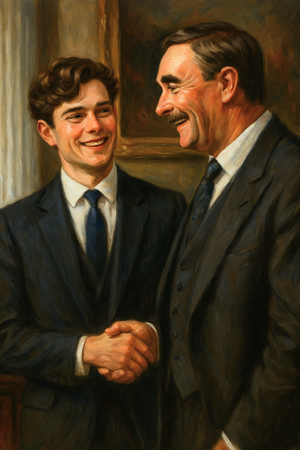
Payment Cycles, occuring from around the 20th day of each month, were suitably streamlined by taxation and calculation sheets first created by William, Prince of Wales during his time as Chancellor. The Permanent Secretary to the Treasury and the Chancellor of the Exchequer used both the original tax sheets and updated versions to successfully streamline the calculations undertaken to ensure fair and proper taxation notices. The Prince of Wales was routinely involved in the maintenance of the coding and infrastructure of these sheets and calculations, and met with both the Prime Minister and the Chancellor on numerous occasions to assist with such matters.
Estates
Estates had been a previous part of the economy back in 2022, during the economic reforms under Charles Somerset. An attempt to return them in the latter half of 2024 failed, due to difficulties and concerns over the lack of management in the project and the legislation, and the lack of reasonable financial opportunities for those investing in Estates.
Estates were not something notable on the Unionist platform, but upon discussions within the Government, the Permanent Secretary to the Culture Office, Prince Tobias, 3rd Duke of Edinburgh, suggested it as an idea once more. The Prime Minister authorised a white paper on the matter.
The Ten Point Plan Memorandum
Published on the 2 July 2025 by the Permanent Secretary, The Ten Point Plan: Revitalising Cultural Participation Through Estates and Land-Based Economic Enterprise was submitted to all interested parties: the Prime Minister, Deputy Prime Minister, and the Chancellor were all informed.
In a declassified letter to the Prime Minister, the Permanent Secretary stated that "As you will be aware, estates have long served as the cultural and economic bedrock of our region. However, repeated efforts to sustain estate interactivity have faltered due to systemic issues: runaway inflation, exclusive models inaccessible to new players, and a regional economy overly reliant on government expenditure."[35]
Premium Bonds
The issue of Premium Bonds was something at the top of the agenda for the Prime Minister upon the passing of the Budget, and it had been something the PM had long worked on: he had introduced a makeshift bond scheme at the tail-end of the Knightstone Premiership, though lack of upkeep from his successors meant it went unused. He also promised a reworking and introduction of the Bonds scheme during the election.[4]
The scheme, as proposed during the campaign, was quickly seized upon by the media, and in the PM's interview with the Kirkwall Lantern, he defended the policy as both wealth-creating and as a fair system. He believed it would help move money around the economy and give lower-income or poorer citizens greater opportunities to amass wealth.[36]
Preliminary Discussion
Following the passing of the Budget, which took up much of the first month of the Premiership for the Treasury, attention quickly turned to various initiatives. In a Cabinet Memo authorised by the Prime Minister, his wishes were that the Premium Bonds scheme be prioritised over both the Stock Market Commission and the Non-Standard Budget.[37]
Internal discussion regarding Premium Bonds was consistent and quick: the Chancellor had a draft act completed within the week and the Prime Minister took a key role in amending and making sure any queries or concerns were ironed out internally.
Premium Bonds Act 2025
The Premium Bonds Act was submitted on the 21 July to the Clerk of the Commons, and opened for debate three days later by the Speaker of the House.[38][39]
The Bill stated that citizens could invest a total of £120,000 into a special account known as the NS&I, or National Savings & Investment Fund: they could withdraw or deposit funds at any time. In return for this, they would forfeit all interest rate on this money, in return for the chance to win the accumulative interest rate earned from all the money within the fund, essentially a form of lottery.[38]
Xavier Sherwood, the Chancellor, delivered the opening statement, where he highlighted the mathematical calculations for winning the interest rate suggested, he stated that:
As the members of this house mentioned countless times before, the economy needs spending opportunities, this bill is aims to do that and is one of many new plans this government has for the economy.
Coming to how the premium bond works; every citizen of the empire is allowed to deposit money into a new account that would be created for this purpose. They are allowed to withdraw or deposit money whenever, but at the end of every cycle (different from the fiscal cycle), when the prize draw is conducted, tickets are assigned to each of the bondholders in proportion to the money they deposit using a formula, and winner (or winners) as selected who would earn the interest accrued on the money deposited (utilizing the central interest rate we introduced this term)...
...The formula, also, was not arbitrarily chosen. We wanted to achieve two things-
1. Make sure that the richer citizens had an incentive to deposit their money, by giving them a higher chance of winning;
2. Ensure that others, especially new citizens still have a realistic chance of winning.
Mr. Speaker, I firmly believe that this legislation marks a crucial step forward in revitalizing our economy, and I commend it to the House and encourage Honourable and Right Honourable Members to lend it their support.[40][38]
The Prime Minister echoed these sentiments, and other pragmatic comments, when discussing the Bill with the Leader of the Opposition: the latter was originally sceptical of the benefits of the Bill.[41][42] The Prime Minister stressed that the fund and scheme were not mandatory, and also reaffirmed the fact that economic reform must start here and that to vote down the bill with no thoughts or evidence to do so would be dismissive and unpragmatic.[41] The Leader of the Opposition agreed, and after private discussions with the PM and Chancellor, said he would support the bill.
There was no other disapproval against the Bill in the Commons, with both the Deputy Prime Minister (Llywellyn Carew), and the new First Secretary of State (Josephine Carew) stating their support, though the latter asked several questions regarding her concern around the feasibility of the lottery system.
The Act passed through the Commons unanimously, with eight votes in favour.[43]
Upon the Act reaching the Lords, there was a similar enthusiasm from some, and many who were wary still believed it was worth passing the act to see what could be achieved and whether it was viable.
The Duke of Cornwall proposed amendments to remove the Chancellor's formula and replace it with a more realistic 1:1 bond system.[44] It passed with 6 Contents, and only one absence.[45]
The formula change created a great deal of internal discussion: the Chancellor was against the change, though in a published memo by the PM's Private Secretary, it stated that they should "not let perfect be the enemy of good. He suggests that the current amendment, which means a "fairer and more effective" system of drawing the winning bond numbers, should be trialled before re-amending to the original formula."[46]
Deregulation of the National Shop
The National Shop deregulation scheme was a key part of the Dorchester Memorandum, in which it was stated: "We must enact an expansion and "deregulation" of the National Shop: by increasing slots in the shop and decreasing fees, we can see more citizens making their mark on what will be a vibrant hub of regional celebration."[4]
Various discussions took place regarding the National Shop, notably within the Treasury but also through various legislative committees.[23] The National Shop Amendments were to be seperate from the main July Budget, to allow for greater scrutiny and flexibility in equal part. These responsibilites were ultimately delegated to the Deputy Prime Minister.[23]
On the 11 July, the Deputy Prime Minister published a report from his official office at 11 Downing Street, outlining the following changes:[47]
- Abolition of the One Item per 90 Days Limit
- Joint decision on the Price of an Item (both HM Government and Private Businesses had to agree on the cost of the product on display)
- Expansion of the Memorabilia Slot (from one to two)
The DPM also submitted the National Commerce (Reform) Amendment Act 2025 to the Commons, for debate.[48]
The Bill passed unanimously (Seven Ayes, and one absence) through the House of Commons with no objections or questions raised; it also passed without problems in the House of Lords (Six Ayes, and one absence).[49][50]
Foreign Policy
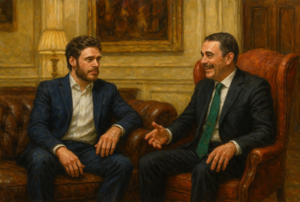
British Foreign Policy was overseen by two Foreign Secretaries throughout the Dorchester Premiership. The first was August Carew, 2nd Earl of Strathmore, who accepted the position as a favour to his father the Marquess of Dorchester, and who intended to retire from frontline politics once he left the foreign office. His main aim was the redrafting of the White Paper "Britain in the world", which was deemed out of date and too verbiose.[51] The Earl of Strathmore entered retirement at the July Cabinet Reshuffle, being replaced by his mother, Josephine Somerset, The Duchess of Bedford. It marked his last tenure as Foreign Secretary, having served longer in the position than any other individual.
Her opening statement remarked that "If a man knows not which port he sails, no wind is favorable."[52] It was the third time she had been Secretary of State for Foreign Affairs.
Britain in the World White Paper
Frontierdom
Blue Ridge
Relations with Blue Ridge had been finalised during the Premiership of the 2nd Duke of Cambridge, though by the time the Duchess of Bedford had become Foreign Secretary, Blue Ridge's diplomatic standing had been severely shaken by scandals. Notably, it involved several backroom deals and insults, resulting in a mass exodus of its former allies. Several of the Empire's own allies cancelled relations, so the Foreign Secretary formally advised a closure of embassies. The Prime Minister amicably agreed and approved the decision, asking for a telegram to be sent as soon as possible. Explaining the decision, the Foreign Secretary said:[53]
After discussions within the Foreign Office, His Majesty's Government has decided to close our embassy with Blue Ridge. Our mission statement is to be "an active, engaged, and constructive force on the world stage." Qualities we would also like to see in our diplomatic partners. Additionally, we have not received an ambassador from Blue Ridge in quite a long while and we have not engaged with them in any tangible diplomatic undertaking. Therefore, we see it as prudent to take the action we have laid out.
The embassies were closed on the 29th July 2025.
London Conference (EoGB-NUK Talks)
The New United Kingdom and the Empire of Great Britain conducted bilateral talks for close to two weeks. It was based off an idea proposed to the Foreign Affairs Council by the Foreign Secretary, suggesting a Union between the two regions: NUK and EoGB would remain seperated onsite, but offsite would share a monarchy, government, forums, and discord. This was an idea already proven to work with other regions, such as The League & Concord. The Foreign Secretary dismissed her own plans as "harebrained" but they recieved significant support from the Prime Minister who felt that the bad atmosphere and difficult political scene of NUK might prove to help with any merger.[54][55]
As a result, talks began at the end of July, with both sides enthusiastic over the general principle of the idea. However, there were several stumbling blocks, such as the sharing of powers within Government, and disagreements over assured positions. In the end, it was decided to amicably end the talks, with all sides on good terms. The Foreign Secretary stated that "While the amount of time and effort which went into these talks were for naught, it demonstrates the creative solutions and lengths an invigorated Foreign Office is willing and hoping to achieve in the coming days and weeks."[54]
Brotherhood of Malice
The Brotherhood of Malice was a key raider-supporting region onsite, and one of the largest in existence. On the 1 August 2025, it's leader went into retirement, and with no suitable successor, closed the region. Despite trying to claim it as a moral victory, it was evident that it was a major blow to raiderdom, and that it would significantly weaken their coordination.[56]
The Prime Minister, in an internal memo, welcomed the news:[55]
The Prime Minister thanks the Foreign Office for their recent reports on the Brotherhood of Malice (BoM). He notes the optimism that has arisen from their defeat, however much the BoM will spin it as a hiatus or moral victory. This is a key blow to Raiders onsite, and it is doubtful that they will be able to coordinate or attack at the same level they had previously. However, the PM has urged caution over the possibility of dissident threats rejoining or regrouping in other regions.
The Foreign Secretary, with the support of the Prime Minister, convened a motion in the Commons to disclose the matter to Parliament. Amongst her statement, she declared:[56]
As one of the few people in this region who attended quite a few of the major operations which gave large blows to Raider Unity and their pernicious cause, I will not miss the Brotherhood of Malice. While we cannot take credit at all at the downfall of the Brotherhood or the taming of Lone Wolves United or any of the raider organisations which have fallen like nine-pins, we did our part as War raged beyond our shores. The Modern Gameplay Compact and Libcord did the heavy lifting, but we were a thorn in the side, just large enough to help frustrate their plans to disrupt life in the post Great Peace world... ...Victory!
British Expeditionary Forces
Modern Gameplay Sanctions
Upon the fall of the Brotherhood of Malice, the Foreign Office introduced a bill to adapt and ratify the Modern Gameplay Compact (MGC) Sanctions, which were in place gameside to efficiently and effectively condemn key raider regions: citizens could not also be current members of the raider regions listed, nor vote in line with them in various World Assembly Propositions, strengthening defenderdom resolve and succeeding in cutting off the toxic raider community.
This was presented first during the Motion for Parliamentary Discussion as requested by the Foreign Secretary. She stated that:
In the coming days and weeks, His Majesty's Government commits to continue being a constructive force within the interregional community, to building strong relationships and to never make the same mistakes as we have done in the past. As we settle into a watchful peace, let us give thanks to every defender, piler, jumper, chaser, organiser, delegate, statesman, and everyone in between who has made this a day a reality.[56]
The Modern Gameplay Compact Sanctions (Adoption) Act 2025 was presented to the Clerk of the Commons on the 4 August: debate was opened the same day. It recieved considerable support, though some members of the Progressive Conservative Framework, notably the Chancellor of the Exchequer, felt it was too restrictive.[57] It passed with six Ayes, one Nay, and one absence.[58]
It recieved even greater support in the Lords, with 6 Contents and one absence.[59]
Plains of Perdition
The Plains of Perdition is a key, game-generated sinker region, where expelled or banned nations find themselves. It is a key Defender region, and has alliances with other key regions such as Europeia.
On the 6 August, the Foreign Secretary announced that formal diplomatic relations had been established between the two regions, signalling a major step forward in Foreign Affairs for the Empire. Formal Embassies were established onsite.[60]
Domestic Policy
Domestic Policy remained the realm of three key departments within the Dorchester Ministry.
The first was the Home Office, headed by Madeline Sherwood, one of only two cabinet ministers to remain in their post when Carew announced his new Cabinet. The Home Office was aided in recruitment and retention by the renamed Gameside Development Office, chaired by Josephine Carew, Marchioness of Dorchester. Lastly, Thomas Carew also served as Secretary of State for Culture, Media, and Sport, personally in charge of cultural initiatives.
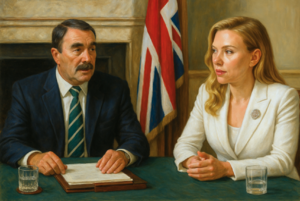
In her opening statement, Sherwood thanked the Prime Minister for his support and hinted at many new initiatives, such as the rewards system for manual recruitment. She concluded by stating "Together, with unity and purpose, we can ensure that the Empire of Great Britain not only endures, but thrives for generations to come."[61]
Josephine Carew struck a similar note in her opening Statement, titled "The Ploughshare", in which she thanked the PM, and spoke of the continued drive towards Frontierdom, to which she would be the Leader.[62]
Josephine Carew was replaced as Secretary of State for Regional Development on 20 July 2025, by Charles Wright, The Baron Huntingdon. In his opening statement, he thanked the Prime Minister and vowed to reverse the decline in nation count caused by the Summer slump.[63]
Recruitment & Retention
Recruitment and Retention saw what the Prime Minister described as "ups and downs" in an internal Cabinet discussion. The Summer Slump, alongside a miasma of inactivity from the Secretary of State for Gameside Development onsite did see a reduction in Nation Count. However, when compared with other similar regions, the Empire remained in good terms, especially onsite where activity actually increased, though a larger Parliament did assist with this.
Three recruitment telegrams were used: one written by the Home Secretary while the older version was penned by the Gameside Development Secretary at the time. Both yielded admirable success percentages for recruitment. Following a dip in performance from these telegrams, a new one was written with input from the Prime Minister, Home Secretary, First Secretary of State, and Permanent Secretary to the Home Office.
Recruitment was forced to stop for a few days in the middle of the term following the departure of Charles Wright, 1st Viscount Kirkwall, who was formerly Permanent Secretary to the Home Office and responsible for the telegrams. Upon his departure, it took several days to change over the expected permissions for stamp drives and other such forms of recruitment to be settled in a new account.
World Assembly
The Government was not fully involved in the personal workings of the World Assembly, but a considered effort to improve endorsement figures was enacted by Josephine Carew - both when she was Gameside Development Secretary, and later when she was Foreign Secretary.
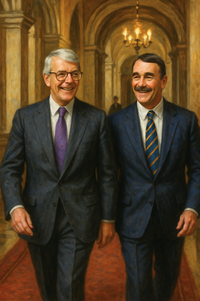
In a statement shortly before the cabinet reshuffle, the Prime Minister announced that endorsements of the World Assembly Delegate was the highest it had been for two years.[64]
Gameside Affairs
The Gameside Development Ministry, later referred to as the Regional Development Ministry, saw renewed activity under Josephine Carew's successor, Charles Wright, The Baron Huntingdon, who created onsite activity via daily questions and polls, as well as a weekly theme.
Considered consistent - but at times monotonous - work, it was nevertheless important in halting the bad effects of the traditional Summer Slump. Compared to many other regions, especially in the Anglosphere, the Empire was in an especially good position, not just onsite but offsite as well.
Naming Controversy
Wellbeing Hub
The Wellbeing Hub was a joint venture by the Prime Minister and the Home Secretary, to serve as a useful signposting hub, and general place for mental health awareness. Various threads were set up with important information, and other posts such as an affirmations thread.
The Prime Minister stated:[65]
While it can be difficult to differentiate the IC and OOC parts of our lives, it is important for this Government that we recognise that we are always here to help where we can: the Barbican Centre acts as a way to bridge that gap, and to provide useful resources and a platform for us to discuss and address particular things, such as our mental health. We hope that in the coming weeks we can provide signposting to websites, create threads on key topics, and work closely with many other people in the community to create another safe space that reaffirms our commitment to preserving the central ideals of this region: transparency, kindness, and understanding.
The Government, and the Prime Minister in particular, continued to support several initiatives linked to the Wellbeing Hub that were submitted privately by the Home Secretary in her capacity as a Member of Parliament, such as the Discourse Act and the MHALPs Amendment Act.
Land Registry
Sporting Organisations
The Duchess of Bedford (Honoured Citizen) Act 2025
To coincide with Unification Day, the decision was taken to create a third Honoured Citizen. The idea, as enshrined in the Honoured Citizen Act 2024 (passed during Carew's first Premiership), entitles the Honoured Citizen to permanent citizenship and to various other perks, such as commemoration in the National Gallery.
The Deputy Prime Minister announced on the 27 July - the day before Unification Day - that this was the Governments plan, as one way among many others to commemorate the seventh anniversary of the region.[66]
The Prime Minister, as is tradition, made the opening statement in the Joint Session, outling the history of "Josi" through all her personas, and both her political and personal contributions to the region:
Yet, and let me speak from the heart, Mister Speaker, we do not just honour Josi because of her achievements, or her titles, or her politics, or, dare I say, her love of a good long letter penned with some poetic title. No, we honour her because without Josi, we do not see the Empire that we have before us today. She has been its guardian, its advocate, its bodyguard and its friend. Throughout it all, her love for the Empire of Great Britain has been unwavering, even when it has been tested and she has had to leave for a time. Yet, she has always remained, in spirit or in person.[67]
Others made heartfelt statements, such as the Lord Weston, HRH The Duke of Somerset, The Speaker of the House, and The Duchess of Somerset, among others.
The Act passed through the Joint Session unanimously, with 14 Ayes, and 1 Abstain (the abstain coming from Josephine herself).[68] It recieved Royal Assent the same day, on the 2 August 2025.[69]
Cultural Events
Tea at Chequers
Canada Day
Remembrance of 7/7
On the 7th July, Carew released a statement from 10 Downing Street, in which he paid tribute to the 52 innocent lives lost in the 7/7 attacks that occured 20 years previously in London. He noted that himself and other Government officials laid wreathes at the cenotaph in remembrance. Carew attended a church service of remembrance.
His statement in full is below.[70]
Today marks the twentieth anniversary of one of Britain's worst and most tragic terrorist attacks, and the horrors of that day still remain fresh in the minds of many; of both those who witnessed those attacks, and for those like myself who have grown up with its tragic consequences.
We must remember with profound sadness the 52 lives, innocent lives, that were lost that day, across four coordinated attacks that struck at the very heart of the Capital. Many more suffered, both physically and pyschologically, from such sorrowful scenes.
However, we must also take this time to thank and to commend the many whose selfless actions, both those in the emergency services and general members of the public, who took the time to help, to comfort, and to support those in need. In even the most tragic of times, the spirit of unity and of selfless sacrifice for the good of all will always shine through. It is this central point that has helped us to heal and to unite so many times since.
Earlier this morning, myself and other Government officials laid wreathes at the Cenotaph. We did so at 8:49am, the same time the first attack occurred. Twenty years prior, we would have been witness to such horrors: today, we were witnesses to the strength and spirit of the British people.
It is at moments such as those that we must remain firm, and forever stay strong in the face of division and adversity.
Tea with the Leader of the Opposition
Wedding of The Duke & Duchess of Somerset
For more information, see: Wedding of Prince Matthew and Lady Madeline Sherwood.
While much of the wedding was organised by the Royal Household - of which Carew was a key member - the Government did support the occasion. For instance, Carew attended the Wedding Committee in a dual role as both Lord High Steward and as Prime Minister.[71]
The Prime Minister, via Executive Order 007, declared Saturday 19 July - the day of the wedding - as a National Holiday.[72]
The Prime Minister attended the ceremony (at Westminster Abbey) and the Banquet and Reception (at Windsor Castle), though moreso in his capacity as Head of the Royal Household and as the grooms brother-in-law.
The Government commemorated the event with the release of two souvenir Toby Jugs, one being a resemblance of the bride, the other being a resemblance of the groom.[73] These were sold in the National Shop.
Unification Day
Unification Day, celebrated every year on the 28 August, celebrated the anniversary of the Empire of Great Britain. Several festivities and initiatives were planned for the day. In conjunction with Jacob Menzies, the Culture Secretary, as well as Esther Sherwood who served as a Second Permanent Secretary in the Culture Office, various games were planned in something known as the "Crystal Palace".[66]
The King released both a trooping the colour ceremony, as well as a speech. The Prime Minister and Deputy Prime Minister also made official speeches, while several members of Cabinet made their own, including a private statement from Josephine Somerset, The Duchess of Bedford.
State Dinner at 10 Downing Street
State Dinners at Number Ten were exceedingly rare: in real life, the late Queen Elizabeth II was only recieved for dinner by Churchill, Wilson, Thatcher, Major, and Blair, and it is considered an exceptional honour. Carew was the first Prime Minister to be able to host His Majesty The King for dinner in the history of the region.
The invitations were delivered on the 6th August, with the dinner scheduled for Saturday 9 August 2025.[74] It was done to mark the Ruby Parliament, or the 40th Parliament of Great Britain, a significant milestone. All Citizens were invited.[74]
The dinner - a black tie event - saw a traditional British menu (written in English, as opposed to French) containing sausage rolls, scampi, pie, and Spam Fritters, to name but a few.[75][76]
The Prime Minister delivered a speech, touching on a message of hardwork and legacy, and that the Parliamentarians and politicians assembled at the dinner had a responsibility to continue with the preservation of these ethics.His toast was "To Parliament".[77] His Majesty also delivered a speech, in which he thanked the Prime Minister for his service:
His Lordship the Marquess of Dorchester has similarly set the standard for Prime Ministers. His quiet, unassuming service; his devotion to good governance and cooperation; and his consistent strength despite whatever he might face have, I believe, indelibly marked the office he has stewarded. Now, as he prepares to leave Downing Street for the last time, for a well deserved rest, I have little to say but thank you.[78]
The King also announced the creation of the Ruby Parliament Medal, awarded to all those who served within Parliament.[78]
The Final Encore Concert
Chief Mousers
For more information, see: Chief Mouser of His Majesty's Government.
The role of felines within a Carew Premiership was something of a long-running joke. Tiff, the PM's own cat, had served previously as the second Chief Mouser of His Majesty's Government, and had routinely served as a Member of Cabinet, mostly as Minister of State for Administrative Affairs. Both the Prime Minister and the Deputy Prime Minister intended, at the beginning of the term, to see that the incumbent Chief Mouser, a ginger British shorthair by the name of Dude (owned ultimately by Prince Tobias, 3rd Duke of Edinburgh) would fittingly retire after a record 300+ days in service.
To coincide with the end of the festivities regarding Unification Day, the Deputy Prime Minister released a poster campaign and opened Chief Mouser nominations on the 2 August.[79]
The following nominations were made:
- Snow White: a Flamepoint Siamese nominated by Oliver Villiers.[80]
- Whiskerfield: a Scottish fold nominated by Esther Sherwood.[81]
- Bill E. Beans: an American shorthair nominated by Josephine Somerset, The Duchess of Bedford.[82]
- Pip: a Sphynx Cat nominated by Madeline Sherwood-Somerset, Duchess of Somerset.
- Pussinder: a Tabby Cat nominated by Philip Wright, 2nd Viscount Kirkwall.
- Diesel Nelson: a Bird nominated by Elise Nelson.
Nominations were open for forty-eight hours.
The vote was opened at 10:25am BST on the 4 August, closing a day later.[83] Whiskerfield won with five votes, and officially became the Fourth Chief Mouser in the history of the region.[84]
Legislative Policy
Education (Amendment) Act 2025
Recognition of Indigenous Peoples
National Gallery (Amendment Act) 2025
Unionist Party Conference
Speculation
Resignation and Successor
Departure
Footnotes
- ↑ [1]Summons to the Palace, The Marquess of Dorchester (Buckingham Palace: 20/06/2025)
- ↑ [2]No.6 | Kirkwall Lantern (Kirkwall Lantern, Scotland: 22/06/2025)
- ↑ 3.0 3.1 [3]Opening Statement of the Prime Minister (10 Downing Street: 21/06/2025)
- ↑ 4.0 4.1 4.2 4.3 [4]The Dorchester Memorandum, June 2025 General Election (The Election Commission, Hustings: 16/06/2025)
- ↑ [5]Appointments to the Cabinet (Buckingham Palace Press Office, Buckingham Palace Press Office: 21/06/2025)
- ↑ [6]"Set for a Shuffle?" The Times, Twitter (#eogb-announcements, Discord: 20/07/2025)
- ↑ [7]Cabinet Reshuffle (10 Downing Street: 20/07/2025)
- ↑ 8.0 8.1 [8]A Reshuffle and a Retirement (10 Downing Street: 20/07/2025)
- ↑ [9]Charles Wrights summons to Number 10, Cabinet Reshuffle (10 Downing Street: 20/07/2025)
- ↑ [10]Lord Huntingdon's request, Cabinet Reshuffle (10 Downing Street: 20/07/2025)
- ↑ [11]Jacob Menzies' summons to Number 10, Cabinet Reshuffle (10 Downing Street: 20/07/2025)
- ↑ 12.0 12.1 [12]"Old Dog. New Tricks?" The Times, Twitter (#eogb-announcements, Discord: 20/07/2025)
- ↑ [13]Josephine Carew's summons to Number 10, Cabinet Reshuffle (10 Downing Street: 20/07/2025)
- ↑ [14]Order of Precedence in Cabinet (Downing Street: 21/06/2025)
- ↑ [15]Order of Precedence in Cabinet (10 Downing Street: 21/07/2025)
- ↑ [16]Update regarding the Civil Service (10 Downing Street: 23/06/2025)
- ↑ [17]Appointment of the Leader of the Opposition, Summons to the Palace (Buckingham Palace: 04/07/2025)
- ↑ 18.0 18.1 18.2 [18]The Prime Minister's Statement, The New Exchequer Act 2025 (House of Commons: 06/07/2025)
- ↑ [19]Prime Minister's Journal (10 Downing Street: 21/06/2025)
- ↑ [20]Downing Street Mailbox (10 Downing Street: 21/06/2025)
- ↑ [21]Opening Statement (His Majesty's Treasury: 22/06/2025)
- ↑ 22.0 22.1 [22]Cabinet Minutes, re: July Budget Act (From The Office of the Prime Minister: 30/06/2025)
- ↑ 23.0 23.1 23.2 23.3 [23]Cabinet Minutes, re: July Budget Act (From The Office of the Prime Minister: 05/07/2025)
- ↑ [24]Personal Comments, re: July Budget Act (From The Office of The Prime Minister: 06/07/2025)
- ↑ [25]March Budget Act 2024 (Queen Elizabeth III Law Library: 17/03/2025)
- ↑ [26]Suspension of Economic Function Act 2023 (Queen Elizabeth III Law Library: 31/12/2023)
- ↑ [27]The Chancellor's Opening Statement, July Budget Act 2025 (Westminster Hall: 07/07/2025)
- ↑ [28]The Prime Minister's Opening Statement, July Budget Act 2025 (Westminster Hall: 07/07/2025)
- ↑ [29]The Prime Minister's Amendment, July Budget Act 2025 (Westminster Hall: 08/07/2025)
- ↑ [30]The Duke of Cornwall's Opening Statement, July Budget Act 2025 (Westminster Hall: 07/07/2025)
- ↑ [31]The Leader of the House of Common's Statement, re: Interest Rates, July Budget Act 2025 (Westminster Hall: 13/07/2025)
- ↑ [32]Personal Comments re: July Budget (From the Office of the Prime Minister: 16/07/2025)
- ↑ [33]The Leader of the House of Commons Statement re: Tabling, The New Exchequer Act 2025 (House of Commons: 06/07/2025)
- ↑ [34]Voting Results, The New Exchequer Act 2025 (House of Commons: 15/07/2025)
- ↑ [35]Memorandum re: Estates Report, Culture Office (Downing Street Mailbox, 10 Downing Street: 03/07/2025)
- ↑ [36]No. 4 | Kirkwall Lantern (Kirkwall Lantern, Scotland: 18/06/2025)
- ↑ [37]Cabinet Minutes, re: Premium Bonds Act (From the Office of the Prime Minister: 19/07/2025)
- ↑ 38.0 38.1 38.2 [38]Premium Bonds Act 2025 (House of Commons: 21/07/2025)
- ↑ [39]Opening of Debate, Premium Bonds Act 2025 (House of Commons: 24/07/2025)
- ↑ [40]The Chancellor's Opening Statement, Premium Bonds Act 2025 (House of Commons: 24/07/2025(.
- ↑ 41.0 41.1 [41]The Prime Minister's Opening Statement, Premium Bonds Act 2025 (House of Commons: 25/07/2025)
- ↑ [42]The Opposition Leader's Opening Statement, Premium Bonds Act 2025 (House of Commons: 25/07/2025)
- ↑ [43]Voting Results, Premium Bonds Act 2025 (House of Commons: 29/07/2025)
- ↑ [44]The Duke of Cornwall's Amendment, Premium Bonds Act 2025 (House of Lords: 01/08/2025)
- ↑ [45]Voting Results, Premium Bonds Act 2025 (House of Lords: 04/08/2025)
- ↑ [46]Memorandum re: Premium Bonds Act (From the Office of the Prime Minister: 03/08/2025)
- ↑ [47]Explanation on proposed National Shop changes (11 Downing Street: 11/07/2025)
- ↑ [48]The National Commerce (Reform) Amendment Act 2025 (House of Commons: 09/07/2025)
- ↑ [49]Voting Results, The National Commerce (Reform) Amendment Act 2025 (House of Commons: 15/07/2025)
- ↑ [50]Voting Results, The National Commerce (Reform) Amendment Act 2025 (House of Lords: 26/07/2025)
- ↑ [51]A slightly late opening statement (The Foreign Office: 30/06/2025)
- ↑ [52]Set In A Silver Sea (The Foreign Office: 21/06/2025)
- ↑ [53]Embassy Closure (The Foreign Office: 29/07/2025)
- ↑ 54.0 54.1 [54]The London Conference (The Foreign Office: 04/08/2025)
- ↑ 55.0 55.1 [55]Cabinet Minutes re: Foreign Affairs Developments (From the Office of the Prime Minister: 04/08/2025)
- ↑ 56.0 56.1 56.2 [56]Foreign Secretary's Statement, Motion for Parliamentary Discussion (House of Commons: 02/08/2025)
- ↑ [57]The Modern Gameplay Compact Sanctions (Adoption) Act 2025 (House of Commons: 04/08/2025)
- ↑ [58]Voting Results, The Modern Gameplay Compact Sanctions (Adoption) Act 2025 (House of Commons: 09/08/2025)
- ↑ [59]Voting Results, The Modern Gameplay Compact Sanctions (Adoption) Act 2025 (House of Lords: 17/08/2025)
- ↑ [60]A State of Mind (The Foreign Office: 06/08/2025)
- ↑ [61]Home Office Opening Statement (The Home Office: 23/06/2025)
- ↑ [62]The Ploughshare (Ministry for Gameside Development: 21/06/2025)
- ↑ [63]Inaugural Statement (Ministry for Regional Development: 21/07/2025)
- ↑ [64]A Gameside Update (10 Downing Street: 21/07/2025)
- ↑ [65]The Barbican Centre (10 Downing Street: 26/06/2025)
- ↑ 66.0 66.1 [66]Upcoming Unification Day (11 Downing Street: 27/07/2025)
- ↑ [67]The Duchess of Bedford (Honoured Citizen) Act 2025 (Westminster Hall: 28/07/2025)
- ↑ [68]Voting Results, The Duchess of Bedford (Honoured Citizen) Act 2025 (Westminster Hall: 02/08/2025)
- ↑ [69]Royal Assent, The Duchess of Bedford (Honoured Citizen) Act 2025 (Buckingham Palace: 02/08/2025)
- ↑ [70]In Remembrance of 7/7 (10 Downing Street: 07/07/2025)
- ↑ [71]Prime Minister's Journal (10 Downing Street: 10/07/2025)
- ↑ [72]Executive Order 007 (10 Downing Street: 19/07/2025)
- ↑ [73]National Shop Commemoration of the Royal Wedding (Ministry for Culture, Media, and Sport: 19/07/2025)
- ↑ 74.0 74.1 [74]State Dinner Invitation (#eogb-announcements, Discord: 06/08/2025)
- ↑ [75]State Dinner at Number Ten (10 Downing Street: 09/08/2025)
- ↑ [76]Menu, State Dinner at Number Ten (10 Downing Street: 09/08/2025)
- ↑ [77]Speech from the Prime Minister, State Dinner at Number Ten (10 Downing Street: 09/08/2025)
- ↑ 78.0 78.1 [78]Speech from His Majesty The King, State Dinner at Number Ten (10 Downing Street: 10/08/2025)
- ↑ [79]Chief Mouser Nominations (Ministry for Culture, Media, and Sport: 02/08/2025)
- ↑ [80]Oliver Villiers Nomination, Chief Mouser Nomination (Ministry for Culture, Media, and Sport: 02/08/2025)
- ↑ [81]Esther Sherwood Nomination, Chief Mouser Nominations (Ministry for Culture, Media, and Sport: 02/08/2025)
- ↑ [82]Josephine Somerset nomination, Chief Mouser Nominations (Ministry for Culture, Media, and Sport: 02/08/2025)
- ↑ [83]Chief Mouser Election (Ministry for Culture, Media, and Sport: 04/08/2025)
- ↑ [84]Statement from Llywellyn Carew re: Chief Mouser (#eogb-announcements, Discord: 05/08/2025)

